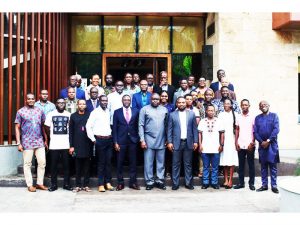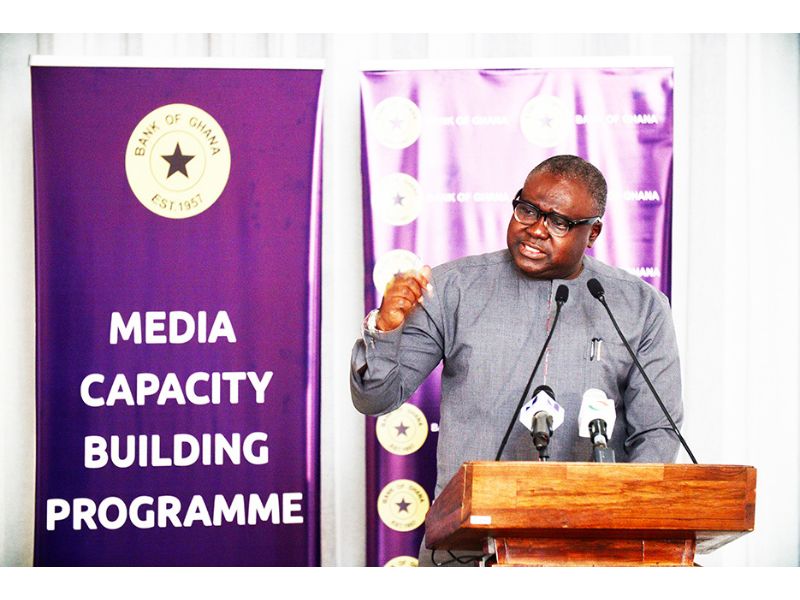
The Bank of Ghana (BoG), in collaboration with the Private News Publishers Association of Ghana (PRINPAG), Journalists for Business Advocacy (JBA) and Institute of Financial and Economic Journalists (IFEJ) has provided a 2-day workshop for journalists in the southern zone of Ghana on Monetary Policy and Financial Reporting.
The training took place from 10th to 11th June, 2022 in Peduase, in the Eastern Region, under the theme: “Sustaining The Recovery: The Role of Journalist In Building Confidence”, with over twenty journalists in attendance.
The workshop focused on the following areas; Monetary Policy practices and understanding Inflation Dynamics in Ghana, Understanding Balance of Payments, introduction to summary of Economic and Financial Data, Regulating FinTechs and Payment Platforms and education on eCedis and Foreign Exchange Market, Currency Volatilities, Causes and Effects.
Addressing participants at the workshop, the Director of Research, BoG, Dr. Philip Abradu Otoo, on behalf of the Governor, Dr. Earnest Addison, disclosed that the training workshop was part of the Bank’s strategic measures aimed at building the capacity of business and financial journalists and to improve understanding and communication of monetary policy issues.
According to Mr. Abradu Otoo, the chosen theme was appropriate and timely, “considering the current heightened global uncertainties arising from the complex mix of softening global growth conditions, accelerating inflation, persisting and broadening supply chain bottlenecks, as well as softening confidence, all of which have been amplified by the geopolitical tensions between Russia and Ukraine.”
He continued that at the start of 2022, the global recovery process seemed to gain some traction from the Covid-19 pandemic effects, supported by improved vaccinations and opened economies, despite persisting supply chain constraints.
These gains, the BoG Director of Research stated, have been short-lived on account of heightened risks emanating from lingering supply chain bottlenecks, China’s zero-Covid policy and the Russia-Ukraine war.
“Concurrently, the global economy has witnessed a surge in inflation, sparked by rising food and energy prices, persistent and broadened supply chain bottlenecks and growing demand pressures as economies reopened”, he added.
The surge in inflation across advanced economies and emerging markets and developing countries, he bemoaned, has triggered swift and coordinated rollback of the Covid-related
accommodative policies that provided liquidity injections to the economy.
“The rising interest rates, especially in advanced economies and strengthening of the US Dollar have led to tighter global financing conditions, leading to capital flow reversals and currency pressures in emerging and frontier economies with less buffers, including Ghana”, he stated.
Mr. Philip Abradu-Otto continued that, the data from the Ghana Statistical Service showed that the economy has rebounded strongly from the impact of the Covid-19 pandemic, stemming largely from all the policy measures that were put in place to forestall a recession.
Moreover, he added that, the banking sector remains resilient, despite the reversal of the Covid-19 regulation relief measures in March 2022, emphasising that it is largely attributable to the comprehensive financial sector reforms that took place before the Covid-19 pandemic struck in 2020, the sector continues to remain liquid, profitable and well-capitalised.
According to him, the press, which seeks to inform, persuade and influence the society must be able to impact the direction of economic thinking and to influence society by harking back to the IPI cardinal principle of journalism.
“In so doing, the press will have to use all available data at their disposal to drive analytical discourse and exude confidence. Journalists must go beyond the data provided them and do more interrogation of the data to understand better, the data generating facts.”
Mr. Abradu went on to say that it is essential to distinguish between accurate reportage that comes from publicly available data and accurate reportage from non-publicly available information, adding that the media’s role in influencing the economic narrative is even more crucial during periods of heightened uncertainty.
He contended that,” This hinge on our believe that the Bank in conjunction with the media can build a critical mass of financial and business journalists capable of accurate reporting on Ghana’s emerging vibrant financial markets and in turn help sustain the economic recovery in this period of heightened uncertainties”,
Monetary Policy Practices
Taking his turn, Mr. Providence Mireku, member of the Research Department, BoG, in his presentation disclosed that the Monetary Policy regulate the value, supply and cost of money in an economy for the attainment of macroeconomic objectives.
These objectives, according to him, are to “achieve price stability by keeping inflation under control, reduce output and employment fluctuations and also exchange rate stability, thus minimise sharp volatilities in foreign exchange flows.”
Mr. Meriku added that the Central Banks traditionally tend to focus on the price stability objective because the high and volatile inflation creates uncertainty, undermines the role of money as a store of value and discourage investment and output growth.
Economic and Financial Data
Dr. Francis Loloh, also a member of the Research Department, BoG, in a presentation on this, stated that the monetary policy committee (MPC) considers three key factors, which are the expected inflation gap, the expected output gap, and the previous monetary policy rate (MPR) level in setting the monetary policy rate.
He educated participants that the 𝑒𝑥𝑝𝑒𝑐𝑡𝑒𝑑 𝑖𝑛𝑓𝑙𝑎𝑡𝑖𝑜𝑛 𝑔𝑎𝑝 is the expected deviation of inflation from the medium-term target (expected target), 𝑒𝑥𝑝𝑒𝑐𝑡𝑒𝑑 𝑜𝑢𝑡𝑝𝑢𝑡 𝑔𝑎𝑝 is the expected deviation of output. GDP growth from its potential (long term) growth and 𝑝𝑟𝑒𝑣𝑖𝑜𝑢𝑠 𝑀𝑃𝑅 𝑙𝑒𝑣𝑒𝑙 𝑑𝑒𝑐𝑖𝑠𝑖𝑜𝑛 is the existing monetary policy rate at the time of the current policy meeting.
Digital Cedi (eCedi)
According to Mr. Kwame Oppong, Director of FinTech and Innovation at BoG, in recent years the idea of issuing digital currencies by central banks has been topical around the globe.
“BoG is one of the first few African central banks which declared its intention to pilot a Central Bank Digital Currency (CBDC) within the framework of its financial sector digitisation program and the overall digitisation agenda of the Government of Ghana.”
He stated that, from the point of the CBDC taxonomy, the digital Cedi (or the eCedi) is a retail token based CBDC and that the concept is like cash payment transactions, where payment is done by transferring banknotes and/ or coins from person A to person B.
Also, the eCedi will be under the full control of BoG, which is the only entity to create and destroy digital cash.








